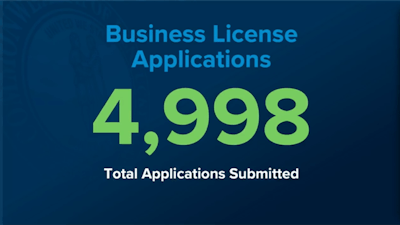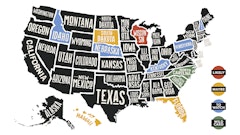
Some industry stakeholders assumed in late July that there was little interest among prospective businesses in obtaining a medical cannabis license in Kentucky. Those assumptions proved false when the state’s application period closed Aug. 31.
That’s because the state received 4,998 applications for Kentucky’s 74 available licenses that will be awarded through lottery drawings in October, according to the state’s Office of Medical Cannabis (OCM).
While only 17 prospective businesses had submitted their paperwork during the first three weeks of the 62-day application period, the applications piled in late, including roughly 4,400 applications, or 88%, in the final four days.
Gov. Andy Beshear, who “proudly” signed legislation in March 2023 to make Kentucky the 38th state to legalize medical cannabis, provided a program update during his weekly press conference Sept. 5.
“This is significantly more than any initial projection,” Beshear said of the 4,998 applications. “The vast majority of these are for dispensaries, and the vast majority of those applications came in really in the last 24, if not 48 hours, before the deadline.”
Roughly 2,350 of the 4,998 applications (47%) were filed in the final 32 hours of the application period, according to the OMC.
Here is a breakdown of the number of applications submitted for each license type:
- 584 cultivators – for 16 available licenses
- 239 Tier 1 (up to 2,500 square feet) – for 10 available licenses
- 190 Tier 2 (up to 10,000 square feet) – for 4 available licenses
- 155 Tier 3 (up to 25,000 square feet) – for 2 available licenses
- 333 processors – for 10 available licenses
- 4,076 dispensaries (allocated across 11 licensing regions) – for 48 available licenses
- 5 testing labs – there is no limit on testing lab licenses
This means cultivation applicants have a 2.7% chance of winning a license through the state’s random lottery process, while dispensary applicants have a 1.2% chance of winning and processor applicants have a 3% chance of winning.
Licenses for a fourth cultivation tier to grow up to 50,000 square feet of canopy will be available in a future application process, according to the OMC.
The abundance of late application submissions will pose a significant challenge for OMC officials, who were working on reviewing the applications in real time as they were filed to help ensure they meet deadlines for the lottery, Beshear said.
In late July, the OMC urged those who had their materials ready to submit them before Aug. 15 to allow the office sufficient time to process all of the entries.
“However, 88% of the 4,998 applications were received in the last four days of the licensing period, meaning our attempts to review them as they come in, and thus to decrease the volume at the end that puts us up against deadlines, we wanted to be lower,” Beshear said. “Turns out it’s going to be higher than anticipated. Despite the last-minute influx of applications, the Office of Medical Cannabis is currently reviewing these applications. We remain on track to issue licenses in 2024. We are increasing our staff, almost doubling them, for reviewing the applications.”
The state had already increased the OMC staff from nine to 29 people to help review the applications. Now the state is adding another 20 staffers to assist the office in evaluating the applications as quickly and accurately as possible, Beshear said.
While the OMC recently removed from its website its indented timeline to implement the medical cannabis program, Senate Bill 47, which Beshear signed into law last year, legalizes medical cannabis in the commonwealth starting Jan. 1, 2025.
Under S.B. 47, Kentucky patients with qualifying medical conditions are prohibited from smoking cannabis but will have access to dried flower for vaporizing, much like neighboring Ohio’s medical program. Kentucky’s law includes a 35% THC cap on flower, while edibles, oils and tinctures are capped at 10 milligrams of THC per serving, and concentrates are capped at 70% THC, according to the legislation. Home cultivation is prohibited.
Patients will have access to an “uninterrupted” 30-day supply, but S.B. 47 did not explicitly define possession limits, instead designating a Board of Physicians and Advisers established under the law to review and recommend what constitutes a “daily supply.”
“[The] most important thing is that we do it right and we do it safely, and we create a program that addresses any concerns and then provides this important health care service to our people,” Beshear said.
The OMC plans to announce the lottery dates for each licensing category in the coming weeks, he said. The lotteries for cultivation and processor licenses will be held before the lotteries for dispensary licenses in the state’s 11 dispensary licensing regions.
Here’s a breakdown of how many license applications were submitted for each dispensary region:
- Bluegrass – 608 applications
- Kentuckiana – 630 applications
- Northeast – 161 applications
- South Central – 477 applications
- Cumberland – 258 applications
- Mountain – 97 applications
- Pennyrile – 369 applications
- West Kentucky – 301 applications
- Lincoln Trail – 342 applications
- Northern Kentucky – 397 applications
- Green River – 436 applications
As OMC officials work toward implementing an operational program by 2025, Beshear has yet to rescind an executive order he issued in late 2022 to allow Kentuckians to possess and consume small amounts of cannabis to treat their medical conditions absent of state legalization. His executive order served as a preemptive pardon for those who purchase their cannabis products at licensed facilities outside the state. (Editor’s note: Federal cannabis prohibition prohibits U.S. citizens from transporting any amount of cannabis across state lines.)
This week, Beshear said he plans to rescind that executive order once Kentucky gets its program up and running.
“My plan is to leave the executive order in effect, which would allow people under certain very specific conditions to secure product from Ohio,” he said. “Once we have dispensaries active across the commonwealth, it is my intent to rescind that executive order. That’s what I told the legislature I would do if we enacted a real medical marijuana program, which we are absolutely doing.”
As the abundance of license applications may delay an eventual retail program launch in the Bluegrass State, some industry stakeholders have expressed concerns about the integrity of the state’s medical cannabis license lottery process, according to Kentucky NORML.
Specifically, allegations surfaced about multistate cannabis operators “gaming” Kentucky’s lottery system by creating multiple limited liability companies (LLCs) under the same parent company to better their odds of winning a license, according to the cannabis reform advocacy group.
Kentucky NORML Deputy Director Lauren Bratcher issued a press release Sept. 1 to address these “misconceptions” and to reaffirm the program’s commitment to fairness and transparency.
“While larger operators may create multiple LLCs for operational purposes, this does not give them an unfair advantage in the licensing lottery,” according to the release. “The system is designed to ensure fairness, with each LLC being subject to the same rules and regulations.”
OMC Director Sam Flynn reaffirmed the integrity of the office’s system.
“We require in these regulations them to provide us their ownership, their corporate structure, and they have to explicitly disclose whether they have a parent of any kind,” he said in the Kentucky NORML release. “Through these mechanisms, we’re able to determine whether there is a parent company, and because we define the parent as the applicant, in that case, the parent company can’t, in a sense, you know, load the lottery with multiple applications.”
In addition, Kentucky’s medical cannabis program put safeguards in place to prevent “application stacking,” where companies submit multiple applications under different names or shell entities to increase their chances of winning a license, according to Kentucky NORML.
For Kentucky’s initial application period that closed Aug. 31, prospective business entrepreneurs could not apply for more than one license type—the state does not permit vertically integrated operations from the program onset. However, according to state guidelines, applicants were allowed to submit multiple applications within one license type.
In other words, applicants were allowed to apply for multiple dispensary licenses but could only submit one application per region. In addition, applicants were allowed to apply for multiple cultivation licenses but could only submit one application per cultivation tier.
“We launched this program with a goal to ensure that our licensing process was transparent and provided everyone a fair shot at being a part of this new and exciting industry,” Beshear said. “Today, the results are clear. There is incredible, if not overwhelming interest, especially among Kentuckians. That’s proof that the program is going to meet its goals.”


























